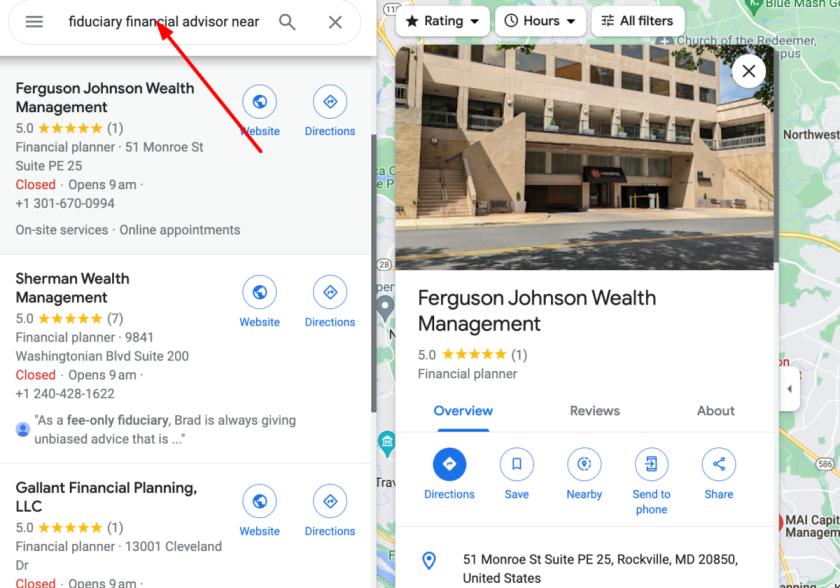
When it comes to choosing a financial advisory firm, a well-thought-out and systematic approach is crucial. A financial advisor providing guidance for financial planning in your state should be well-versed in the laws, regulations, and practices related to these areas.
Before searching for a financial advisor, it’s important to have a clear understanding of what you want to achieve financially.
Whether you need help with retirement planning, investment management, estate planning, or different financial matters, identifying your specific goals will help you find an advisor with the right expertise.
When searching for the right financial advisor in near you, it is crucial to consider their background and areas of expertise.
By considering key factors such as Assets Under Management (AUM), client count, fee structure, firm age, and clients per advisor, you can make an informed decision that aligns with your financial goals and preferences.
Some of the specific areas of knowledge that a financial advisor in your neighbourhood should possess include:
1. State Tax Laws: Understanding states’ tax laws, including income tax, property tax, and sales tax allows firms to provide clients with relevant tax planning strategies.
2. Estate Planning Laws: Familiarity with estate planning laws, including wills, trusts, probate, and inheritance taxes, to offer compliant estate planning guidance.
3. State Specific Retirement Accounts: Knowledge of state-specific rules for retirement accounts like IRAs and 401(k) plans, helping clients optimize their retirement savings.
4. State Programs and Incentives: Awareness of state programs and incentives related to tax planning and real estate investments, advising clients on how to utilize these opportunities.
5. Networking and Professional Connections: Having strong local connections within the financial and legal community in the region to collaborate with other professionals, such as tax and estate planning attorneys, who possess specific knowledge of state laws and regulations.
To Find The Right Financial Advisor, Near You, Follow These Steps:
Look for financial advisors who are registered either with the Securities and Exchange Commission (SEC) or the Financial Industry Regulatory Authority (FINRA).
These organizations provide databases where you can search for registered advisors in your area.
Additionally, you can confirm an advisor’s certification by visiting the Certified Financial Planner (CFP) Board’s website. Other reputable resources to explore include the National Association of Personal Financial Advisors (NAPFA), local Chambers of Commerce, and the Financial Planning Association (FPA).
Ensure they don’t have any disciplinary actions or complaints against them by checking with the SEC, FINRA, or state regulatory agencies.
Consider local financial directories such as SmartAdvisor Match by SmartAssetTM, WiserAdvisor, FPA Planner Search etc to find top financial advisors near you.
If you’re specifically looking for fee-only or fee-first financial advisors, you can explore directories like Garrett Planning Network, Fee-Only Network, XY Planning Network etc.
Use mapping services like Google Maps, Bing Maps, and others. Enter keywords such as “financial advisor near me” or “portfolio management firm near me” to conduct local searches.
Pay attention to ratings and reviews to assess the quality and reputation of financial advisors or firms in your area.

Additionally, reading online testimonials and recommendations from past clients can provide valuable insights into an advisor’s performance and client satisfaction.
For individuals with specific financial goals like real estate investments and tax planning, it is recommended to review their websites, brochures, or LinkedIn profiles to understand their areas of specialization and experience.
Explore our service areas near Maryland and Virginia :
1. Check Credentials and Licenses:
Verify that the financial advisors you are considering hold the necessary licenses and certifications. Look for certifications such as Certified Financial Planner (CFP) or Chartered Financial Consultant (ChFC), as they demonstrate the advisor’s qualifications and expertise.
Additionally, ensure that your chosen advisor is a fiduciary, as this guarantees that they are legally obligated to act in your best interests.
2. Evaluate Disclosures and Negative Records:
As you narrow down your options, thoroughly evaluate any disclosures or negative records associated with the firms. It is essential to choose firms with clean records to provide you with peace of mind and confidence in their services.
3. Clients Per Advisor:
Prefer firms with a lower ratio of clients per financial advisor. A lower client-to-advisor ratio means that the advisor can provide personalized recommendations and tailored financial strategies that align with your unique situation.
Consider whether the firms primarily serve individual investors and have financial planners on staff.
Some major well known firms may prioritize serving corporate or institutional clients, which could impact the level of emphasis on individual investor needs.
4. Account Minimums:
Take note of the account minimums set by the advisors. Some firms may have no set minimums, while others may require a significant investment. Understanding these minimums will give you an idea of the types of investors the advisors typically serve.
5. Consider Fees and Compensation Structure:
Financial advisors may charge fees in different ways, such as hourly fees, flat fees, or a percentage of assets under management. Make sure you have a clear understanding of their fee structure and how it aligns with your budget and financial goals.
Pay close attention to the fee structure of each firm. Fee-only advisors, who earn money solely from client fees rather than commissions, tend to have fewer conflicts of interest.
Understanding how advisors earn money will help you determine if their fee structure aligns with your financial situation and goals.
6. Consider Firm History and Longevity:
Consider the history and longevity of each firm. Firms with a longer track record often offer a greater depth of experience and stability, which can be advantageous in managing your financial affairs.
7. Interview Multiple Advisors:
Lastly, schedule initial consultations or interviews with several financial advisors. During these meetings, ask questions about their experience, investment philosophy, fees, and how they will work with you to achieve your goals.
Pay attention to their communication style, willingness to listen, and their ability to explain complex financial concepts in a way that you understand.
By taking these factors into account and conducting thorough research, you can find the financial advisory firm that best suits your needs and goals.
Use our guide of questions that are essential to ask an advisor before you hire them.
20 Questions to Ask a Financial Advisor
Don’t make a mistake by working with the wrong financial advisor. Ask the right questions to determine if a financial advisor is right for you.
Some financial advisory services are much more hands-on and personal than others. When it comes to getting help with your financial situation, including managing your budget, making important financial decisions, and understanding your overall financial health, it’s important to find a financial advisor who will take the time to really get to know you.
This might involve meeting in person to talk about more complicated or sensitive topics that require a deeper level of understanding and trust.
On the other hand, if you just need someone to keep an eye on and make occasional adjustments to your conservative, long-term investment portfolio, you may not need as much personal interaction.
This type of oversight can often be done without a lot of in-depth conversations or face-to-face meetings.
Ultimately, choose a financial advisor whom you feel comfortable with and trust to handle your financial matters. It’s important to have a good rapport and open communication with your advisor, as you will be working together to achieve your financial goals.
We are a fee-only, fiduciary wealth management firm in Rockville, Maryland. Offering a range of services from investment management to personal financial planning, retirement planning, and everything in between.
If you have any questions about our firm, our services, or how our expert fiduciary advisors can help you achieve your financial goals, call us today at 301-670-0994.
Use our guide of questions that are essential to ask an advisor before you hire them. Don’t make a mistake by working with the wrong financial advisor. Ask the right questions to determine if a financial advisor is right for you.
